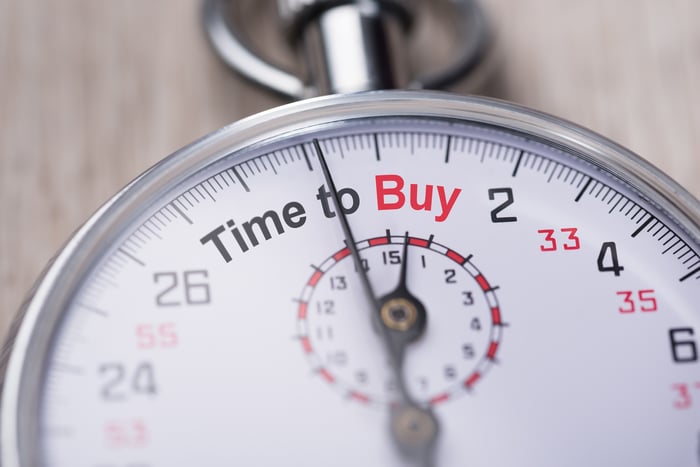Just when you thought there were no more records left to be broken, Wall Street shows investors that it still has tricks up its sleeve.
On Monday, investors witnessed something truly historic, and disheartening. Despite the Federal Reserve's best effort to calm already roiled markets with its largest emergency rate cut in history (100 basis points), the stock market logged its second-worst percentage decline of all-time, as well as the largest single-session point decline we've ever witnessed for the Dow Jones Industrial Average, Nasdaq Composite, and S&P 500.

Image source: Getty Images.
The blame for these wild vacillations rests with the spread of coronavirus disease 2019 (COVID-19) and the economic uncertainty mitigation efforts surrounding this illness have created. Lockdowns in a number of developed countries, as well as restaurant closures in select U.S. states, has made it abundantly clear that, in order to win the battle against coronavirus, a major economic toll will be felt.
But there are a number of reasons to be exceptionally optimistic about the stock market's long-term prospects. For instance, the Volatility Index, or VIX, recently hit its highest levels since the financial crisis. Spikes in the VIX above 50 have always been strong buy signals for patient investors with a long time horizon.
Furthermore, each and every one of the S&P 500's 37 previous corrections of at least 10% since the beginning of 1950 have eventually been completely erased by a bull-market rally. Essentially, if you buy high-quality businesses and hang onto them for extended periods of time, you should make money. Smart investors know this, which is why they've been buying into this coronavirus-induced panic.
With the benchmark S&P 500 down 30% from its all-time high after Monday's historic meltdown, now is the time to put your capital to work. If you have $5,000 in disposable cash (i.e., cash you don't need to pay bills or cover emergencies), you should consider following the lead of the world's smartest investors and buy into the following four top stocks.

Berkshire Hathaway CEO Warren Buffett at his company's annual shareholder meeting. Image source: The Motley Fool.
Berkshire Hathaway
Sure, you could by an S&P 500 tracking ETF to generate similar returns to the stock market, or you could do what the smartest investors have done for decades and place your trust in the buy-and-hold ethos of investing great Warren Buffett by purchasing shares of Berkshire Hathaway (BRK.A -0.53%) (BRK.B -0.51%).
Berkshire Hathaway has two ways of making money. Over many decades, Buffett and his team have acquired roughly five dozen businesses from a variety of industries and sectors that contribute to Berkshire's sales and bottom line. Buffett also runs an investment portfolio that, as of Dec. 31, 2019, consisted of 52 securities. Since the beginning of 1965, the annual average return, in terms of Berkshire Hathaway's per-share market value, is 20.3%, which more than doubles the dividend-included annual average return of 10% for the S&P 500. In aggregate, Buffett has led Berkshire to 2,744,062% in per-share market value gains in 55 years.
Although Buffett is exposed to corrections and bear markets like any investor would be, Berkshire was sitting on a record cash hoard of $128 billion, as of the end of 2019. You can rest assured that Buffett is putting this cash to work with wonderful businesses now going for fair prices. This should mean healthy long-term gains await Berkshire Hathaway's shareholders.

Image source: Getty Images.
TJX Companies
I know, the idea of buying into retail with coronavirus fear keeping consumers from leaving their homes probably doesn't sound palatable. But TJX Companies (TJX 0.08%), which is behind such chains as T.J. Maxx and Marshalls, isn't your run-of-the-mill retailer.
What makes TJX so special is the company's ability to acquire brand-name product. Unlike many deep-discount peers that lack brand-name appeal, TJX is able to use its size and geographic reach within the U.S. to buy brand-name apparel and accessories in bulk at a significant discount. It's then able to pass along these discounts to consumers, yet still rack up incredible margins. Consumers have consistently shown that they flock to brand-name merchandise, which is what makes the TJX model golden.
Following Monday's market meltdown, TJX is valued at a mere 13 times next year's earnings, which may or may not need some minor adjustment, depending on how long it takes to curb new coronavirus infections in the United States. That's the lowest forward price-to-earnings ratio for TJX Companies since 2010! This is too good of a retailer to be valued this cheaply, and the smartest investors know it.

Image source: Getty Images.
Jazz Pharmaceuticals
Another absolute head-scratcher is why specialty drugmakers like Jazz Pharmaceuticals (JAZZ 2.56%) are being raked over the coals despite the fact that coronavirus is unlikely to have any impact on its operating performance.
As a refresher, we don't get to choose when we get sick or what ailment(s) we develop, which creates a steady stream of business for both novel and generic-drug developers. Just because COVID-19 is spreading does not mean that Jazz's patients are no longer in need of their therapies.
What's more, Jazz Pharmaceuticals focuses its efforts almost entirely on orphan indications. This ultimately minimizes the company's exposure to competition, as well as allows it significant pricing power on its novel therapies. It's worth noting that, with Sen. Bernie Sanders (I-Vt.) now considered to be a longshot for the Democratic Party presidential ticket nomination, significant drug-price reform is likely off the table in Washington, D.C., removing another concern for Jazz.
As of Monday's closing bell, a share of Jazz Pharma is going for less than 6 times next year's forecast earnings per share. That's insanely cheap for a company that can still deliver modest annual sales growth.

Image source: Getty Images.
Palo Alto Networks
Although value stocks typically take precedence during stock market downturns, don't overlook high-growth tech stocks that, in many cases, may present incredible value relative to their potential cash flow.
Take cybersecurity company Palo Alto Networks (PANW 1.33%), which has been hit by coronavirus concerns, and also wound up delivering a guidance miss when it reported its fiscal second-quarter operating results three weeks ago. Since the stock market peaked on Feb. 19, Palo Alto has lost 45% of its value. More important, it's seen its forward-year price-to-cash-flow ratio sink to an all-time low of 12.7. That's roughly half of its five-year average, which is notable considering that the long-term trend for cash-flow generation is higher, even with reinvestment expected to pick up in cloud protection.
Aside from cash flow, another selling point for Palo Alto is that a good chunk of its business model is subscription-based. Through the first six months of fiscal 2020, $1.11 billion of $1.59 billion in sales are tied to subscription and support, with the remainder being products. This is relevant since subscriptions are unlikely to be cancelled during periods of economic weakness, and this category delivers much juicier margins than products.
As one last note, cybersecurity isn't optional. It's a basic-need service for all enterprises, making Palo Alto a no-brainer buy for smart investors.





